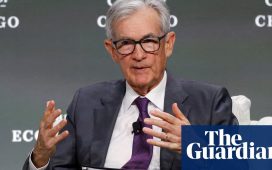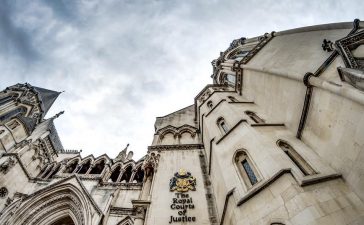Sterling closes in on $1.30 level; stocks extend rally
The pound has risen by 0.4% against the dollar today, hitting a high of $1.2962 and closing in on the $1.30 level.
Sterling last traded at $1.30 more than two years ago. Investors are attracted to the UK currency following Labour’s landslide victory a week ago, amid political instability in France, where Sunday’s elections resulted in a hung parliament.
The pound has also been lifted by strong UK GDP data yesterday combined with a surprise monthly fall in US consumer prices and a lower-than-expected annual inflation rate of 3%. This led to investors pilling on bets of a September interest rate cut from the US Federal Reserve, and dragged the dollar down against major currencies.
Oil prices are rising, with Brent crude up by 0.55% to $85.88 a barrel, on expectations that Fed rate cuts would stimulate demand for crude in the United States, the world’s biggest oil consumer.
European shares have extended their rally, on the back of growing expectations that the Fed will start cutting interest rates soon. The FTSE 100 index in London is 25 points, or 0.3%, ahead at 8,249 while the German Dax has gained 0.37%, the French CAC has climbed 0.66% and Italy’s FTSE MiB rose 0.56%.
Key events
Closing summary
The pound has risen by 0.5%, hitting a daily high of $1.2981, boosted by strong economic growth data and the perceived stability offered by UK assets following Labour’s decisive election victory last week.
Sterling is close to a one-year high of $1.2995, touched on 27 July 2023, and approaching the $1.30 level, where it last traded in April 2022.
Britain risks a tech “talent drain” to the US if British pension funds fail to back the sector, according to the co-founder of a UK chipmaker that has announced its sale to Japan’s SoftBank.
Nigel Toon, the co-founder and chief executive of Graphcore, said domestic pension funds were giving inadequate support to private businesses in the UK.
“They’re certainly not investing in private companies here in the UK,” he said. “How can we expect businesses to grow without those pools of capital unless they secure funding from other sources?”
As well as British pension fund investors missing out on the benefits, said Toon, there was a risk that UK tech talent is lured away by foreign investors that have stepped in to provide growth funding. US-based venture capital firms could, for instance, require British startups to move across the Atlantic, the Graphcore boss said.
Our other main stories:
Thank you for reading. Have a fab weekend. We’ll be back on Monday. Take care – JK
The UK justice secretary, Shabana Mahmood, has just announced the release of 1,000 prisoners in an attempt to ease the pressures faced by overcrowded prisons.
James Timpson, now minister of state for prisons since resigning from his chief executive post at Timpson Group earlier this week, has long pushed for reform of prisons. He has made headlines for his radical approach to business including hiring ex-convicts, writes Jonathan Yeboah.
The company was founded in 1865 by William Timpson and has since operated as a family business spanning through five generations. It has long specialised in shoe repairs, and has also expanded into key cutting, watch and phone repairs.
A key Timpson principle has been giving people a second opportunity in life, and it started hiring former prisoners in 2002. Of its 5,600 staff, 10% are ex-offenders.
It does not require its applicants to apply with a CV, rather, they look for “fun, interesting, snappy” people, James has said.
Timpson’s net profit grew by 56% between 2021 and 2023, despite a fall in sales in the midst of the Covid pandemic. Last year, it made profits of £38.3m. The group owns seven subsidiaries which vary from photo printing to dry cleaning to locksmith services.
Branch managers and their teams at Timpson are actively encouraged to offer discounts and even free services to customers. Remarkably, 4% of Timpson’s transactions are done at no charge. “Giving things away is the most profitable thing we do. Customers always remember kindness,” the company asserts.
James Timpson, also the author of the book, The Happiness Index, urges businesses and business leaders to put people at the heart of business.
Carpetright seeks investment to stave off collapse
Jane Croft
Carpetright, one of the UK’s biggest flooring retailers, is seeking additional investment to stave off possible collapse after filing a notice of intention to appoint an administrator.
The company confirmed it had filed the notice of intention with the high court to appoint administrators whilst it works to finalise additional investment to secure the long term future of the company.
The move, first reported by the Times, effectively gives the company 10 days protection from creditors whilst sales negotiations continue and Carpetright tries to secure a future for its 272 stores which employ 1,852 people in the UK. Carpetright will continue to trade during this process. PwC has been lined up as possible administrators but has not been appointed.
High court records show that Carpetright, advised by law firm Travers Smith, filed the notice on Friday.
The firm has been struggling in recent months due to the economic downturn which has seen consumers have cut back on spending on furnishings and furniture due to the economic downturn and rising cost of living.
In addition Carpetright suffered a cyberattack which disrupted trade in April and subsequently impacted its plans to restructure.
Kevin Barrett, chief executive of parent firm Nestware Holdings, said:
We remain focussed on securing external investment to ensure as few customers and colleagues are impacted as possible.
They are our main priority and we are taking all appropriate action to make sure they are informed and supported through this process. We have begun promising conversations with interested parties that are moving in the right direction, encouraging us that Carpetright has a viable future.
Germany’s Lufthansa cuts 2024 profit target for second time, sending aviation shares lower
Germany’s flagship carrier Lufthansa has slashed its 2024 profit guidance for the second time and warned on profits for the second quarter, sending its shares lower.
Along with other airlines, the company is struggling with high labour and operating costs coupled with weaker revenues per passenger because of pressure on ticket prices.
The share price fell nearly 4% and later traded 2.4% lower, pulling down British Airways owner IAG by 2.8% and Air France-KLM by 2.1%.
Lufthansa said its adjusted earnings before interest and tax fell to €686m in the three months to June, from €1.1bn a year earlier. It reports full second-quarter results on 31 July. It now expects a full-year profit of between €1.4bn and €1.8bn, down from its previous estimate of €2.2bn.
It is launching a turnaround programme affecting Lufthansa and its regional carrier Cityline.
A market-related decline in yields in all traffic regions – especially in Asia – had a negative impact.
Lufthansa Airlines is particularly affected by the challenges posed by the negative market trend and by inefficiencies in the flight operations of Lufthansa and Cityline, also due to delayed aircraft delivery. It is becoming increasingly challenging for Lufthansa Airlines to break even for the full year. To counteract this, a comprehensive turnaround program is being launched.
Airbus launches cost-cutting drive including hiring freeze
Airbus has launched a new cost-cutting drive including a hiring freeze in its planemaking business, following recent cuts in production targets.
Code-named “LEAD!” the new initiative will tackle an increase in unit costs, and address productivity issues, Reuters reported, citing an internal memo to staff.
The shares are up 0.85% today.
Citigroup profit lifted by 60% jump in investment banking revenue
Citigroup beat Wall Street expectations with quarterly profits, lifted by a 60% jump in investment banking revenue and gains in its services division, sending its shares up 3% before the bell.
The third-largest US lender reported a profit of $3.2bn in the three months to 30 June, up from $2.9bn a year earlier. Revenues rose by 4% to $20.1bn, helped by a $400m gain from the partial sale of Visa stock in May. Investment banking fees hit $853m amid a resurgence in corporate deals.
Chief executive Jane Fraser said:
Our results show the progress we are making in executing our strategy and the benefit of our diversified business model.
The results come two days after US regulators fined Citi $136m for making “insufficient progress” in fixing data management problems discovered in 2020. Citi had already booked the penalties and additional investments related to this in the second quarter.
Fraser is carrying out a sweeping overhaul of the bank’s sprawling businesses in a bid to improve its performance and cut costs.
US producer prices rise moderately in June
Producer prices in the United States rose moderately in June, causing US stock market futures to turn negative briefly as this dampened hopes of interest rate cuts.
The producer price index rose by 0.2% in June from the month before, after being unchanged in May, the Labor Department’s Bureau of Statistics said.
The annual rate picked up to 2.6% from 2.4%.
Wall Street futures dipped slightly on the news, but are now up again, pointing to a broadly flat open in just over half an hour.
Yesterday, a surprise 0.1% dip in consumer prices in June from May, which took the annual rate to 3% from 3.3%, boosted expectations of a September rate cut.
Jerome Powell, chair of the US Federal Reserve, told lawmakers during testimony this week that the inflation environment was improving.
Holding interest rates too high for too long would threaten economic growth and jobs, he told Congress on Tuesday. The US is “no longer an overheated economy”, Powell said, adding that its job market has “cooled considerably” from its surge after the early damage inflicted by the pandemic.
Post Office CEO will step back temporarily to focus on Horizon inquiry
The Post Office chief executive, Nick Read, said he would temporarily step back from the role so that he can give his “entire attention” to the next stage of the Horizon inquiry.
Read wrote in a note to staff that he and the board agreed he should step back over the summer to prepare for the next phase of the inquiry, which will look at current practices at the Post Office, and begins in September.
Deputy chief executive Owen Woodley will take charge of day-to-day activities for the next seven weeks until the end of August, Read said.
The note, sent yesterday, said:
It is vitally important that we demonstrate the changes we have made and give confidence to the inquiry and the country at large that ‘nothing like this could happen again’.
Following a discussion with Nigel [Railton, incoming chair] and the board, we have agreed that I should give my entire attention to the task of preparing the business for Phase 7.
More than 700 subpostmasters were wrongly prosecuted by the Post Office and handed criminal convictions between 1999 and 2015 because the Japanese firm Fujitsu’s faulty Horizon IT system made it look as though money was missing at their branches.
Read succeeded former boss Paula Vennells, who this year forfeited her CBE following public anger over her handling of the Horizon crisis. She testified to the inquiry over three days in May, in a sometimes tearful set of evidence sessions about her conduct.
In February, the business and trade committee of MPs expressed a lack of confidence in Read’s leadership, accusing him of giving misleading evidence.
He has also denied a claim made by former chair of the Post Office Henry Staunton that he had threatened to resign unless he got paid more.
He was “exonerated of all misconduct allegations” following a report into his behaviour earlier this year. The external report, which the Post Office has not released, was said by Staunton to contain allegations about Read’s “conduct and lack of his management of the many governance and compliance issues”.
The Post Office said at the time that the review cleared him of any misconduct claims, and that he had the full backing of the board to continue to lead the business.
Octavio Marenzi, chief executive of Opimas, a management consultancy focused on global capital markets, said:
JP Morgan’s results showed us two things: First, investment banking and equities trading did really well compared to last year.
Secondly, we see Main Street banking beginning to sputter. Provisions for credit losses were up significantly, showing us that JP Morgan is expecting to see a rough patch in the US economy. Also, there was a big increase in interest expense, which grew far more quickly than interest income. Nevertheless, JP Morgan has navigated a challenging interest rate environment very well.
JPMorgan profit jumps 25% on investment banking fees, Wells Fargo profit dips
A number of big US banks have kicked off the earnings season.
JPMorgan Chase posted a 25% rise in second-quarter profit, lifted by rising investment banking fees and an accounting gain of $8bn from a share exchange deal.
The largest US bank made a profit of $18.15bn in the three months to 30 June, compared with $14.5bn a year earlier. It benefited from a plan to exchange some of its shares in Visa, the world’s biggest payment network.
Wall Street banks have benefited from an increase in companies raising capital in the debt and equity markets, and an uptick in fee income from advising on M&A deals.
However, chief executive Jamie Dimon cautioned:
While market valuations and credit spreads seem to reflect a rather benign economic outlook, we continue to be vigilant about potential tail risks.
These tail risks are the same ones that we have mentioned before. The geopolitical situation remains complex and potentially the most dangerous since World War II — though its outcome and effect on the global economy remain unknown.
Next, there has been some progress bringing inflation down, but there are still multiple inflationary forces in front of us: large fiscal deficits, infrastructure needs, restructuring of trade and remilitarization of the world. Therefore, inflation and interest rates may stay higher than the market expects. And finally, we still do not know the full effects of quantitative tightening on this scale.
The bank’s shares dipped by 0.6% in trading before the opening bell.
Wells Fargo fared less well, reporting lower quarterly profits because of higher deposit costs amid intense competition for customers’ money, sending its shares down by more than 5% in pre-market trading.
The bank’s net income fell to $4.91bn between April and June, from $4.94bn a year earlier.
Net interest income, the difference between what a bank earns on loans and pays out for deposits, slid by 9% to $11.9bn, which was worse than expected. Average deposit costs jumped to 1.84% from 0.71%.
China posts record trade surplus as firms rush to beat tariffs
Here’s our full story on the China trade figures:
China posted a record $99bn (£76.4bn) trade surplus last month amid signs of importers bringing forward orders to beat higher tariffs on goods from the world’s second biggest economy.
The latest official figures from Beijing showed exports growing at their fastest rate in 15 months, while the weakness of China’s domestic economy resulted in falling imports.
The size of China’s trade surplus was far bigger than the $85bn expected by the financial markets and comes at a time of heightened concern in developed countries about Chinese exports.
Higher US tariffs on Chinese-made electric vehicles and other hi-tech products come into force on 1 August, while higher EU import duties on Chinese electric vehicles came into force earlier this month.







